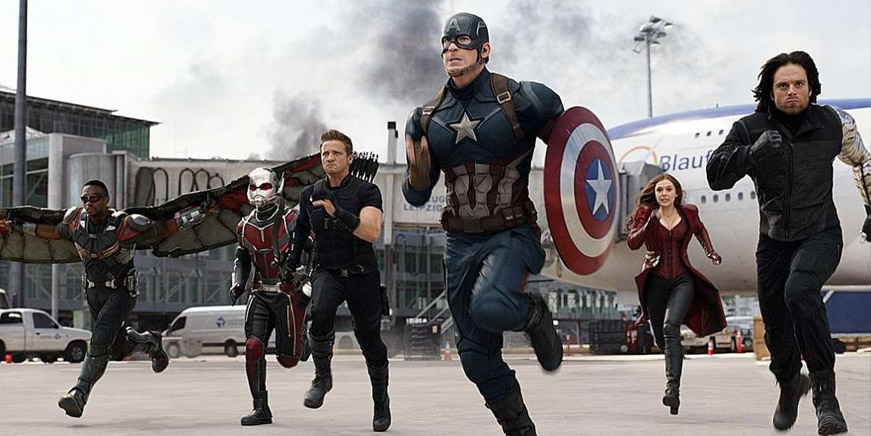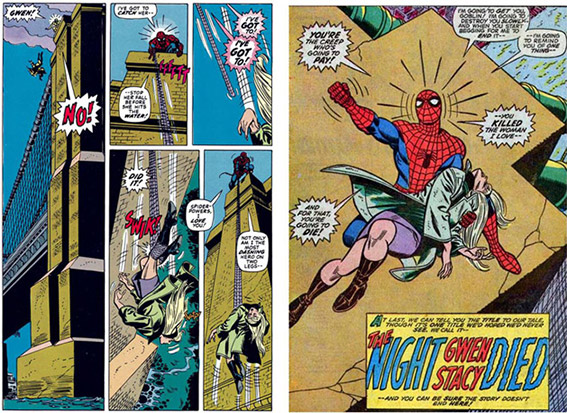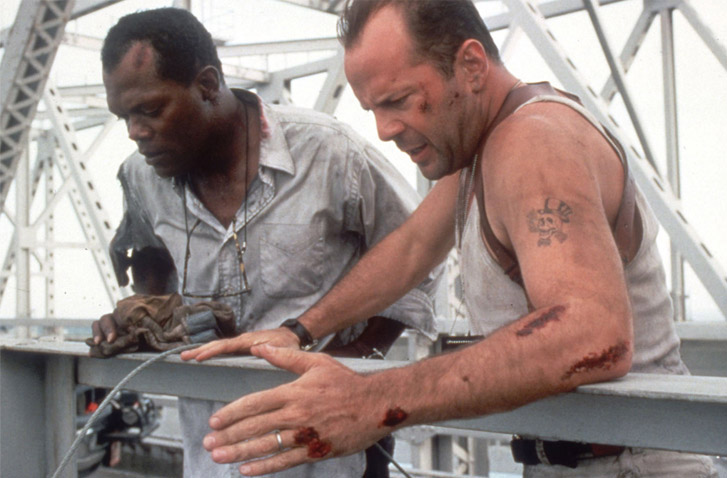| |
"Several years ago, a studio head told me this: "If I've got to come up with a slate of sixteen pictures a year, I know going in that four of them are turkeys. I just hope they're not too expensive and I don't lose too much on them. Eight or nine are going to be programmers – decent enough entertainment if I'm lucky; money-makers. The last three I have hopes for."" |
| |
William Goldman, Adventures in the Screentrade (1982) |
Goldman's conclusion, after hearing that somewhat forlorn summing up of Hollywood, was that those last three 'quality' pictures are not being made any more. There's a telling story of the executive who was pitched a brilliant original idea for a movie and he/she said "It's a shame it hasn't already been made and then we could remake it..." Isn't that depressing? No one is taking a chance on anything that people have never heard of any more. No more Matrixes, Withnails or Buckaroo Banzais... It seems Hollywood will do originality as long as someone has already done it before. If this were true of 1982, as far as the mainstream is concerned, in 2016 this depressing fact is carved out in adamantine. Three of the four trailers preceding the new Marvel blockbuster – if it can be announced as a great success before it's even really opened – were for, you've guessed it, Marvel films. Well done, Kevin Fiege (pronounced Figh-Gee with a hard 'g'), congratulations Stan Lee! I bow at the business acumen and empire building that is taking the world by storm (and I don't mean Johnny for all you FF fans out there). It's starting to feel like we can have way too much of a good thing.

When the lily pads have covered the pond, there's nowhere else for other ideas to spawn and so cinema that doesn't involve characters with enhanced powers is pushed to the margins. There were forty-one movies reviewed in this month's Sight and Sound (June 1016) and only three were blatantly identified with the Hollywood mainstream (the Jungle Book remake, The Huntsman sequel and another sequel Batman vs. Superman). How the other thirty-eight are going to get a look in commercially or artistically is beyond me. I just hope it's not beyond their distributors' abilities or the public's taste to bite into something less samey, sugary and seegeey (ouch, but you know what I mean). The Goldman book – well recommended by the way – is a treasure trove of industry insider information from what seems like a bygone age but he was lamenting the dearth of serious cinema in 1982. God knows what the poor man thinks of cinema today. But back then, he was afraid the world was being consumed by 'Comic Book Movies'... Just as an appetizer to the book for you, he defined The Deer Hunter as a CBM and Bambi (an animated cartoon made in 1942) as definitely not one. Read the book to find out why. His general criteria were vague as he acknowledged that personal taste will determine whether you are watching a CBM or not. Just for the record, here are Goldman's boxes to tick so you know if you're watching one.
"1. Generally, only bad guys die. And if a good guy does kick, he does it heroically.*
2. There tends to be a lack of resonance: Like the popcorn you're munching, it's not meant to last.
3. The movie turns in on itself: Its reference points tend to be other movies. If, for example, there had been no Saturday afternoon serials, there would have been no frame for Raiders of the Lost Ark.
4. And probably most important: The comic-book movie doesn't have a great deal to do with life as it exists, as we know it to be. Rather, it deals with life as we would prefer it to be. Safer that way."
*And even if a good guy does die heroically (yes, I'm talking to you, Phil Coulson), he's resuscitated by alien DNA to headline a spin-off TV series... Of course he is.

Fairly straightforward, perhaps. There is no greater example of point three in Civil War when Spider-man shares the fact he's seen this 'really old movie called The Empire Strikes Back...' which gives him the clue how to defeat a giant adversary... Talk about the shark devouring its own tail. But this isn't a review of Captain America: Civil War. If pushed I'd say it was an overlong, endless fight scene, unencumbered with any emotional depth. OK, there's one character who gets to do an Inigo Montoya as in "You killed my parents, prepare to die..." It boasts world-class production values, and what little humour it possesses squeezes out infrequently like soft soap through a clenched fist. What would normally be jaw-dropping effects in any past decade we now look at and depressingly go 'Meh'. To me, the whole Marvel milieu has sputtered into the arena of the moribund. There are only so many ways a superhero can hit another superhero. The eighty-seventh time it tends to come across as repetitive. When I saw the shot late in the trailer of Cap, Bucky and Iron Man slugging it out, trading blows as if all three were synchronised, hitting a stake into the ground, I sighed just a little. If that was in the trailer it meant that this is what the producers think we want to see. It's not what I want to see and I don't even know if asked, if I could answer that question. Has the bar of narrative resonance been lowered so far that any half-way intelligent remark in a Marvel film is seen as worthy, worldly wisdom? Is that why the reviews are so positive?
Look, I was an original, front line Marvel fan, a child of the sixties and seventies who hoovered up, whenever I could find them, original Marvel comics, rare as hen's dental bills in the suburbs of South Wales. I can still quote from certain Spider-Man issues. I love these characters and with some reservations I have enjoyed the movies. This is perhaps more to do with the involvement of a certain Joss Whedon but having said that The Winter Soldier had the luxury of a good plot and some very satisfying political intrigue and I thought Iron Man III a delight with real emotion – Tony with PTS syndrome – tons of wit and surprises (take a bow Shane Black). But I've had hours and hours and hours of the fighting shtick now and the few and getting fewer surprises that the new films deliver aren't enough to make me care in the slightest. These movies are terrific luxury crisps, ephemeral and light, tasty, yes, but they are not fulfilling a hunger, satisfying a need, something four courses of real food may be able to do. Ever eaten a bar of chocolate to banish hunger? Doesn't work, does it? Delicious but ultimately ineffectual against what the body actually needs. We all need cinematic food but there's no one in the kitchen. Or if there is, they're running out of different ways to re-engineer the same damn recipe.
The narrowest definition of a 'Comic Book Movie' is a movie based on a comic book or comic book characters (duh). We have gone a little beyond that, methinks. Part of the immense appeal of the comic used to be that it could do something no other medium could. It could conjure up any image (the writers' and artists' imaginations being the only limit) and it was also non-linear. You could stop, go back and remind yourself of something you may have skimmed or hadn't registered.

Yes, all this is comparable to the digital experience but you have to remember that the age of 'having everything at your fingertips and therefore being infinitely malleable' only began in earnest about a decade ago. Some of us still have only close to dial-up speed broadband... What happened to Hollywood too was the digital revolution. Now Superman can fly photo-realistically (no more wires or backdrops) because Superman can be a digital creation. Special visual effects have become so sophisticated that given enough money and time, anything can be photo-realistically conjured up for your pleasure. So, the theory (and sound business sense) went that comic imagery was now dynamically doable and if there were enough fans who'd wait in line to see the Hulk smashing... in 3D, then, serve it up. Well, it seems like there are many millions of people who want to see their heroes on screen fighting the good fight, over and over. And over. It's over. At least for me.
For reasons with which I cannot grapple, some people seem to think that the word 'comic' in terms of a multi-paneled, visual narrative with speech bubbles is synonymous with something only children concern themselves with. The word 'bubbles' does not help. Yes, we all know – or perhaps we don't given my age – the Beano and the Dandy, survivors from a bygone age while many others fell by the wayside. Yes, of course, these are children's comics. But then there are children's clothes and adults' clothes. They're all clothes. There has been a resurgence and a burgeoning critical respectability for what's known as the 'comic book' or to use its adult title, the 'graphic novel'. The addition of the second word 'book' in the former nomenclature lends the object some adult credibility until the latter term is employed as reinforcement. But if any of you know Maus, Watchmen, V for Vendetta, Sandman, Swamp Thing, 300 or Frank Miller's Sin City and Alan Moore's Batman: The Killing Joke, you know that these are as far from children's works as it's possible to get in both (sometimes literal) execution and content. Despite their concerns with other-worldy and impossible beings and situations, the writers of these works know all too well how metaphor, allusion and allegory work. They are students and masters of narrative, illuminators of the human condition and in some ways (their devious and brilliant ways) there is no better method of delving into character motivation and uncovering human ambition and desire than parsing the human from the über-human. Wasn't Star Trek TOS just a colourful, tinted window through which to regard the human animal in the 1960s?

| |
"We know they can't die as they'll be required for the 898th film, slated for October, as it happens, so how anyone can make any kind of emotional investment is a total mystery to me." |
| |
Civil War Review, Deborah Ross, The Spectator |
While finding myself in complete agreement with Ms. Ross, I had to dig down and figure out what value I got from watching invincible characters doing impossible things. Aside from a certain Mr. Bond, whose entertainment value relied not on us caring for character but appreciating cleverness, wit and spectacle, most movie heroes had to obey some widely held rules pertaining to what physics had in store for you if you pushed your luck. Throughout the 80s, the human body was over-fetishised almost to the point of farce. A simple roll could cure the usually fatal effects of a fall, any fall over twenty feet. Even bullet wounds were shrugged off although the head and heart shot still managed to slow the heroes down a tad. It got to be so ridiculous I started shouting things at the screen. The most heinous example of flipping physics the finger for me was a movie in which the hero and his partner are moving slowly down a wire from a 4x4 to a ship passing beneath a bridge. The wire is compromised and both fall forty or fifty feet landing on their backs on a metal container. A few "Urghs..." later and both are walking and talking like they'd landed on marshmallows thirty feet deep.

In fact it was this particular hero who started all this ridiculousness. To my recollection, all this began with our vulnerable, estranged policeman husband visiting his wife on the other side of the country with the hope of getting back in her good books after a great job took her away from the professionally committed husband. This movie introduced the idea of 'exaggerated reality', producer Joel Silver's idea that the laws of physics should be pushed far enough that the moment evoked a stunned awe but not so far that the film looks like a cartoon. In effect, said Hotdog magazine, thirteen years ago, "...guns should be that little bit louder, explosions that little bit brighter and a hero's body that little bit more resistant to death." Well, if logic is to be obeyed (heaven forbid) Die Hard's everyman John McClane should have died at least four times in the original movie but hey, we didn't mind because (drum roll) we cared and the film was so good, we forgave a lot of silliness.
It seems my caring tank has run dry when it comes to these Marvel and DC juggernauts. I'll leave you with a question I would have loved to have asked Stanley Kubrick on the nature of reality and cinematic reality... In 1969, Kubrick released 2001: A Space Odyssey, one of the greatest films ever made and a visual and philosophical tour de force. He was lauded for being the first filmmaker to employ absolute silence over the many sequences set in space as reality would dictate (there are no air waves to carry sounds in a vacuum). Get this. Kubrick was applauded for this nod to reality as are most filmmakers who deliberately rob the audience of a giant in terms of a film's emotional communication – sound. Joss Whedon did the same in both the TV show Firefly and its movie spin off Serenity. Bravo! But my question to Kubrick is simple. If there is no sound in space which you have amply conveyed and been congratulated for, then where the fuck did the eighty piece orchestra come from? |